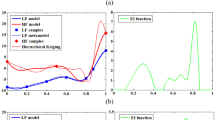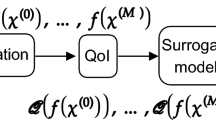Abstract
A popular method to reduce the computational effort in simulation-based engineering design is by way of approximation. An approximation method involves two steps: Design of Experiments (DOE) and metamodeling. In this paper, a new DOE approach is introduced. The proposed approach is adaptive and samples more design points in regions where the simulation response is expected to be highly nonlinear and multi-modal. Numerical and engineering examples are used to demonstrate the applicability of the proposed DOE approach. The results from these examples show that for the same number of simulation evaluations and according to metamodel accuracy, the proposed DOE approach performs better for majority of test examples compared to two previous methods, i.e., the maximum entropy design method and maximum scaled distance method.
Similar content being viewed by others
References
Barthelemy J-FM, Haftka RT (1993) Approximation concepts for optimum structural design—a review. Struct Optim 5:129–144
Chen VCP, Tsui KL, Barton RR, Meckesheimer M (2006) A review on design, modeling and applications of computer experiments. IIE Trans 38:273–291
Clark SM, Griebsch JH, Simpson TW (2005) Analysis of support vector regression for approximation of complex engineering analyses. J Mech Des 127:1077–1087
Cormen TH, Leiserson CE, Rivest RL, Stein C (2001) Introduction to Algorithms, 2nd edn. MIT, Cambridge
Cox DD, John S (1997) SDO: a statistical method for global optimization. In: Alexandrov N, Hussaini MY (eds) Multidisciplinary design optimization: state of the art. SIAM, Philadelphia, pp 315–329
Cressie NAC (1993) Statistics for spatial data. Wiley, New York
Fang K-T, Wang Y (1994) Number-theoretic methods in statistics. Chapman & Hall, New York
Fang K-T, Lin DKJ, Winker P, Zhang Y (2000) Uniform design: theory and application. Technometrics 42:237–248
Farhang-Mehr A, Azarm S (2002) A sequential information-theoretic approach to design of computer experiments. CD-ROM proceedings of the 9th AIAA/ISSMO symposium on multidisciplinary analysis and optimization, Atlanta
Farhang-Mehr A, Azarm S (2005) Bayesian meta-modeling of engineering design simulations: a sequential approach with adaptation to irregularities in the response behavior. Int J Numer Methods Eng 62:2104–2126
Farhang-Mehr A, Azarm S, Diaz A, Ravisekar A (2003) Approximation-assisted crashworithness design of front-end of a pickup truck. CD-ROM proceedings of the ASME 2003 design engineering technical conference. Chicago
Goldberg DE (1989) Genetic algorithms in search, optimization and machine learning. Addison-Wesley, Boston
Gunawan S, Azarm S (2005) A feasibility robust optimization method using sensitivity region concept. J Mech Des 127:858–865
Hedar AR (2005) Test problems for unconstrained and constrained global optimization, global optimization methods and codes. System Optimization Lab, Kyoto University, Kyoto
Jin R, Chen W, Sudjianto A (2002) On sequential sampling for global metamodeling in engineering design. CD-ROM proceedings of ASME IDETC, design automation conference. Montreal, Canada
Johnson ME, Moore LM, Ylvisaker D (1990) Minimax and maximin distance designs. J Stat Plan Inference 26(2):131–148
Jones DR (2001) A taxonomy of global optimization methods based on response surfaces. J Glob Optim 21:345–383
Jones DR, Schonlau M, Welch WJ (1998) Efficient global optimization of expensive black box functions. J Glob Optim 13:455–492
Kalagnanam JR, Diwekar UM (1997) An efficient sampling technique for off-line quality control. Technometrics 39(3):308–319
Koehler JR, Owen AB (1996) Computer experiments. Handbook of statistics, vol 13. Elsevier, New York
Li G (2007) Online and offline approximations for population based multi-objective optimization. Ph.D. Dissertation, University of Maryland, College Park
Lindley DV (1956) On a measure of the information provided by an experiment. Ann Math Stat 27:986–1005
Lophaven SN, Nielsen HB, Søndergaard J (2002) Aspects of the matlab toolbox DACE. IMM-TR2002–13. Technical University of Denmark, Lyngby
McKay MD, Beckman RJ, Conover WJ (1979) A comparison of three methods for selecting values of input variables in the analysis of response from a computer code. Technometrics 21(2):239–245
Meckesheimer M, Booker AJ (2002) Computationally inexpensive metamodel assessment strategies. AIAA J 40(10):2053–2060
Myers RH, Montgomery DC (1995) Response surface methodology: process and product optimization using designed experiments. Wiley, New York
Owen AB (1992) Orthogonal arrays for computer experiments, integration and visualization. Stat Sin 2:439–452
Roux WJ, Stander N, Haftka RT (1998) Response surface approximations for structural optimization. Int J Numer Methods Eng 42:517–534
Ruzika S, Wiecek MM (2003) A survey of approximation methods in multiobjective programming. J Optim Theory Appl 126(3):473–501
Sacks J, Welch WJ, Mitchell TJ, Wynn HP (1989) Design and analysis of computer experiments. Stat Sci 4:409–435
Sasena MJ (2002) Adaptive experimental design applied to an ergonomics testing procedure. CD-ROM proceedings of the ASME IDETC. Montreal, Canada
Sasena MJ, Papalambros PY, Goovaerts P (2000). Metamodeling sampling criteria in a global optimization framework. CD-ROM proceedings of the 8th AIAA/USAF/ISSMO symposium on multidisciplinary analysis and optimization. Long Beach, CA
Schonlau M, Welch WJ, Jones DR (1997) Global versus local search in constrained optimization of computer models. In: Flournoy N, Rosenberger WF, Wong WK (eds) New developments and applications in experimental design. Institute of Mathematical Statistics, Beachwood
Shewry MC, Wynn HP (1987) Maximum entropy sampling. J Appl Stat 14:165–170
Simpson TW, Booker AJ, Ghosh D, Giunta AA, Koch PN, Yang R-J (2004) Approximation methods in multidisciplinary analysis and optimization: a panel discussion. Struct Multidisc Optim 27(5):302–313
Watson AG, Barnes RJ (1995) Infill sampling criteria to locate extremes. Math Geol 27(5):589–608
Weiss MA (1997) Data structures and algorithm analysis in C, 2nd edn. Addison-Wesley, Boston
Author information
Authors and Affiliations
Corresponding author
Rights and permissions
About this article
Cite this article
Li, G., Aute, V. & Azarm, S. An accumulative error based adaptive design of experiments for offline metamodeling. Struct Multidisc Optim 40, 137–155 (2010). https://doi.org/10.1007/s00158-009-0395-z
Received:
Revised:
Accepted:
Published:
Issue Date:
DOI: https://doi.org/10.1007/s00158-009-0395-z




